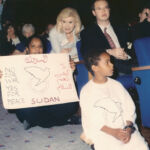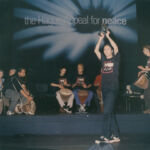From the 11th to the 15th of May, 10000 people from 100 countries, representatives of 600 non governmental organisations, simple citizens, young people and children, even ministers of foreign affairs, Nobel Prize winners, professors, personalities of international prestige and heads of international organisations participated in the The Hague Appeal for Peace.
Just before the end of the 20th century, the cruellest century in the history of humanity, and just before the rise of the 21st century, the global society of citizens realised a magnificent Conference for Peace in Hagen, dedicated to the children and in young people, whom the new century exclusively belongs to.
From Greece, the participants in the Conference were the Foundation for the Child and the Family, and the ELPIDA Association of Friends of Children with Cancer.
In her speech, in the opening of the Conference, the President of the two organisations, Mrs Marianna V. Vardinoyannis, referred to the culture of peace pointing out that peace cannot be imposed, cannot be a summit decision; it can only to be born from the base, because up to now, all the laws and decisions concerning peace as well as those against violence were not effective, due to the fact that the mentality stayed the same. As a basic means of action for the change of this mentality it is proposed to incorporate the culture of peace in the educational programmes as well as to intensify the fight of illiteracy.
Within the frame of the Conference, a round table discussion was organised by the Foundation for the Child and the Family and the ELPIDA Association, with the topic The effects of radiation in childrens health. The speakers of the round table were Mrs Katherine Metaxotou, Professor of the Medical Faculty of Athens University, Mr Fredrik Heffermehl, Vice-President of the International Peace Bureau, Mr Michel Fernex, Professor of the University of Vasilia and Member of the Board of Trustees of the International Physicians for the prevention of nuclear war, Mrs Linda Walker, Director of the Chernobyls children project.
As all the speakers stressed, the fact that radioactivity has very serious impacts not only on childrens health of today but also on the health of the next generations, it is very essential that the international community takes active measures for the prevention of nuclear accidents, the direct aid for the victims of radioactivity as well as the reinforcement of research programmes on the prevention of health issues related to radioactivity.
It is worth noting that The Hagen Appeal for Peace was organised by 74 international institutions, such as International Amnesty, the Red Cross, the International Association of Lawyers Against Nuclear Arms (IALANA), the International Peace Bureau (IPB), the International Physicians for the Prevention of Nuclear War (IPPNW), the World Federalist Movement-Institute for Global Policy (WFM), the Earth Action International, the European Action Council for Peace in the Balkans, the International Fellowship of Reconciliation, the United Nations of Youth, Women for Peace etc. Personalities of international prestige participated, such as the Archbishop Desmond Tutu, Professor Joseph Rotblat, Elie Wiesel, Jody Williams, Mairead Maguire Corrigan, Jose Ramos Horta, Graca Machel, Oscar Arias Sanchez, Alfredo Perez Esquivel, Maj-Britt Theorin, Norman Borlaug, Dr Bernard Lown, Christa Wolf, Sir Peter Ustinov, Queen Noor of Jordan, Sheikh Hasina, Kofi Annan, Carol Bellamy, Arudhati Roy, etc. The agenda on the Peace and the Justice in the 21st century was formed based on four fundamental axes:
1. Reinforcement of the institutions and laws that protect the human rights.
2. Promotion of peaceful solution of the arguments and prevention of violent conflicts.
3. Development of the efforts for disarming including the suppression of nuclear weapons.
4. Investigation of the causes of war and development of the culture of peace.
The Hague Appeal for Peace began and ended with triumphs and as the international press commented, it constitutes a mark for the World Peace Movement.
The political mottos and the flags were left aside. The delegates focused on the search for practical solutions for ceasing fire and establishing peace.
It was for the first time that the new diplomacy model was presented in such a spectacular way; the model which, in the closing ceremony of the Conference, the UN Secretary-General, Mr Kofi Annan, characterised as the revolution of the non governmental organisations.
The Hague Appeal for Peace summarised and expanded the initiative of the citizens of the world society to start a dialogue directly with the leaders, the governments and the international organisations so that they all collaborate for the establishment of peace and justice in the world.
The promise, wish and appeal of Hague was:
PEACE IS A HUMAN RIGHT; IT IS ONLY COLLECTIVELY THAT WE CAN DEFEND IT AND WE WILL DO IT.
The Hague Agenda for Peace and Justice for the 21st Century. Conference Edition.



